Jul 18, 2025 16:48 IST
First Published on: Jul 18, 2025 at 16:48 IST
Hindi films have always thrived on regional stereotypes in portraying punjabi, tamil, gujarati or Bengali character, shoving their distinct culture in a cubbyhole of stereotips. Filmmakers set the camera lens for the audience rather than let the audience find their own lens to read the character or even trust the character to win hearts. The latest Victim of this cinematic trope is the Liberal Bengali Woman.
The pendulum has been swinging between the old-worth grace of a goddess-like paro in Devdas or Lalita in Parineeta to the schizophrenic and mysterious manjulika of Bhool bhulaiyaaa. That is when piku banerjee burst on the screen with her cotton kurtas, her Everyday elegance, her straggsforwardness and her firec choice to be her father’s caregiver, shemed so anchoring. Piku is a woman first, a Bengali second.
Howver, the same can be said of her descendants, Rani Chatterjee in Rocky and Rani Kii Prem Kahaani and now madhu bose of Aap jaisa koiBoth from Producer-director Karan Johar’s Stable. Each one is a sassy, self-hasured, outgoing and fiery woman, daring to choose lesser men, even drinking them out of their shell of patriarchy. They reclaim agency and sexuality with the same elan, they should not be a metaphor for the other. They end up being clones What is Problematic is the sexiness of their attire and image being a metaphor for their intellectualism and free spirit. In our social, the right to be seen and heard is still out of reach for most women, hoping to grasp any oportunity, golden or not.
Even more problem is the fact that they are all upper caste Bengali women, coming from a privileged, elite background and enabling environment that automatically. They have been had to earn their place as such. This rarefied context puts them leagues aboves the majority of women who still haven’t found a voice in the mainstream.
It is in that sense that both rani and madhu become a shell, a filmmaker’s pretenance of gender parity, Rather than holding up a mirror to social. Contrast this with Bengali Filmmakers Basu Chatterjee and Hrishikesh Mukherjee, WHO HUMANIVE PROTAGONists, Bengali Or not, With Working-Class Sensibilities and an Erydeness, with Meet-Buste. And romances in a rained-out city, all of them working in office, taking the bus and train, munching peanuts. In fact, Bengali women were the first in India to activities pursue education and entertain the workforce, partyularly in the late 19th and early 20th centuries.
The woman’s renaissance in Bengali was not only LED by the empowered women of the privileged elite, like the tagores of Jorasanko, but by Ordinary Women. Rokeya Sakhawat hossain was not formally aducated in English but became a leading writer and activity. Sarala Ray Founded The Gokhale Memorial School and Championed Women’s Access to Higher Education. Binodini Dasi, Born into A Poor Family, Became a Courtesan, but Awestruck by the stage, she care when she was only 12. Forced to quit the stage at age 23, she docree prejuded. Women like her autobiography.
Bengal’s Revolutionaries Completed Women from Both The Lower Strata and Middle Classes, Most of Whom Did Not Have Access to Formal Education. Matangini hazra, a peasant woman, and 15-yar-ald widow nanibala devi, who was a runaway and learnt English at a Christian mission, to armed for armed for armed struggle against colonial room. The Tebhaga Movement Had Women Peasants Demanding their Rights as Sharecroppers. Pritilata Waddedar and Kalpana Datta, Both from Ordinary Families, not only because armed armed revolutionaries but managed underground networks and courier rns for the resistance movement. This Mass Women’s Participation Challenged Traditional Gender Roles. In fact, Middle-Class Bengali Women Began To Part of the Urban Workforce Late 1940s Onwards Despite Bigger Challenge of Acceptability.
This evolution of the modern Bengali women is important in understanding where she should not be trivialized or forgotten. Challenging Patriarchal Ideologies and Constructs, The Early Pioneers did not wage a war but just stood up to be counted. In his novel, ghare baire (the home and the world), Rabindranath Tagore Had Himself articulated this when he wrote. “For we women are not only the deities of the household fire, but the flame of the soul itself.” And that flame doesn’t need a bralette, a wishpy saree or high heels. Sensulated is about the fullness of a live experience, not just the right to show a cleavage. If anything, the mainstream film industry has ended up proping cardboard cutouts instead of celebrating flesh-and-water.
rinku.ghosh@expressindia.com



